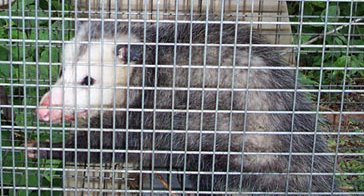Who Should I Contact?
As of July 1, 2010, Palm Beach County Animal Care and Control is no longer able to send Animal Control Officers to pick up wildlife such as orphaned baby birds or mammals. The Division will continue to handle rabies surveillance for Palm Beach County, which includes quarantine, testing, and response to rabies vector species and human or animal exposure.
Residents should contact
Busch Wildlife Sanctuary in Jupiter,
561-575-3399 or the
SPCA Wildlife Care Center in Ft. Lauderdale,
954-524-4302.
Additional names of individuals who rehabilitate wildlife may be obtained from the Florida Fish and Wildlife Conservation Commission,
561-625-5122 or www.myfwc.com or go directly to the
list for Palm Beach County.

What Licensed Trappers are Available?
Residents should contact the Florida Fish and Wildlife Conservation Commission,
561-625-5122,
www.myfwc.com, or consult the Yellow Pages of your telephone directory under "animal rescue and removal services" or "pest control."
What Will Animal Care and Control Do For Me?
- Continue to respond to reports of Rabies vector species having been exposed to humans or domestic animals.
- Continue to respond to reports of Rabies vector species threatening the public.
- Continue to respond to reports of Rabies vector species displaying symptoms of Rabies.
- Continue to accept injured, sick, or orphaned wildlife with a donation of $30 for purposes of euthanasia.
- Provide a rehabilitator center contact information.
What is a Rabies Vector Species?
Foxes, skunks, raccoons, groundhogs, coyotes, and bats are the most common rabies vector species and can carry the rabies virus without showing any of the typical symptoms.
What Are the Symptoms of Rabies?
- Craving to eat anything, including inedible objects
- Constant growling
- Dilated pupils
- Disorientation, stumbling, falling, wander aimlessly
- Erratic behavior
- Episodes of aggression, unprovoked aggression, some animals attack anything that moves
- Unusual friendliness
- Facial expression showing anxiety and hyper-alertness
- Irritability
- No fear of natural enemies (e.g., wild animals may not be afraid of people)
- Restlessness
- Roaming
- Seizures
- Trembling and muscle incoordination, paralysis often in hind legs or throat, which causes whining, drooling,
or frothing at the mouth
- Vocalizations ranging from chattering to shrill screams
- Nocturnal animals may become unusually active during the day (remember, some daytime activity is normal, especially when nocturnal animals are feeding their young)
- Raccoons walk as if they are on very hot pavement
How Can I Protect My Property from Wildlife?

- Secure garbage cans/containers with a tight lid.
- Do not keep pet food outdoors. Feed pets indoors.
- Keep landscaping maintained and keep overgrowth to a minimum.
- Remove piles of yard debris and thick vegetation. This is a perfect place for nesting.
- Secure openings to gutters, garage, sheds, and attic areas.
- Consider outdoor lighting during the evening.
- Control insects in the ground. Wild animals dig for food and will return if the food source is available.
- Prevent access to the roof by trimming tree branches away from the house.
- Do not feed or provide food for wild animals. It is illegal to feed raccoons and is punishable up to a $500 fine and court appearance.
- Removing a wildlife from your property must be done by a permitted trapper, which can be obtained through the Florida Fish and Wildlife Conservation Commission,
561-625-5122 or www.myfwc.com.
Coyotes In Our Community
For more information regarding coyotes in our community and how peacefully co-exist, please visit, http://myfwc.com/conservation/you-conserve/wildlife/coyotes/